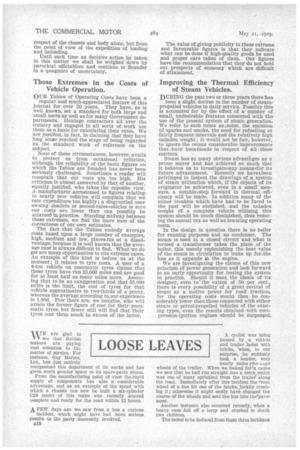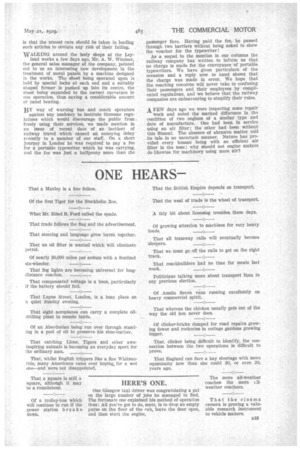LOOSE LEAVES
Page 44

Page 45

If you've noticed an error in this article please click here to report it so we can fix it.
WE are glad to see that British makers are pay ing real attention to the matter of service. For instance, Guy Motors, Ltd., has just entirely reorganized this department of its works and has given much greater space to its spare-parts stores.
From the manufacturing point of view the rapid supply of components has also a considerable advantage, and .as an example of the speed with which a chassis can now be built a six-cylinder C28 model of this make was recently erected complete and ready for the road within 12 hours.
'A FEW days ago we saw from a bus a curious incident, which might. have had more serious. results to the party innocently involved. A cyclist was being passed by a vehicle and trailer laden with bricks, 'when, to our surprise, he suddenly took a header, very nearly underlthe ,'Lear wheels of the trailer. When we looked fora clink we saw that he had rim straight-into a brick, which was one of many sprinkled from the trailer along the road. Immediately after this-incident the-front wheel of a bus hit one of the bricks, luckily crushing it; otherwise it might easily have changed the course of the wheels and sent the bus into thetpal exnent.
Another instance also occurred recently, when a heavy case fell off a lorry and crushed to death two children.
The moral to be deduced from these three incidents in is that the• utmost care should lie taken in loading such articles to obviate any risk of their falling.
WALKING around the body shops at the Ley land works a few days ago, Mr. A. W. Windsor, the general sales manager of the company, pointed out to us an interesting new development in the treatment of metal panels by a machine designed in the works. The sheet being operated upon is held by special locks at each end and a suitably shaped former is pushed up into its centre, the sheet being expanded to the correct curvature in one operation, thus saving a considerable amount of panel beating.
BY way of warning bus and coach operators against any tendency to institute tiresome regulations which would discourage the public from freely using their services, we made mention in an issue of recent date of an incident of railway travel which caused an annoying delay recently to a member of our staff. On a short journey in London he was required to pay a fee for a portable typewriter which he was carrying, and the fee was just a halfpenny more than the passenger fare. Having paid the fee, he passed through two barriers without being asked to show the voucher for the typewriter!
As a sequel to the mention in our columns the railway company has written to inform us that no charge is made for the conveyance of portable typewriters. We have given particulars of the occasion and a reply now to hand shows that the charge was made in error. We hope that the coaching concerns will never take to confusing their passengers and their employees by complicated regulations, and we believe that the railway companies are endeavouring to simplify their rules.
A FEW days ago we were inspecting some repair work and noted the marked difference in the condition of two engines of a similar type and date of manufacture. One had been in service using an air filter ; the other had been without this fitment. The absence of abrasive matter told its tale in no uncertain manner. Nature has provided every human being with an efficient air filter in the nose; why should not engine makers do likewise for machinery using more air?




















































































































